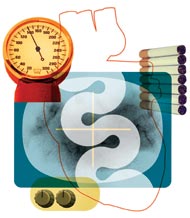
NY Times' health columnist, Jane Brody, recently wrote a bit of fluff for her paper:
"CT Scans of the Heart Come With Trade-Offs
In her report, she says:
Coronary CT scans are being sold directly to the public, and they have found a market in health-conscious people who can afford them. But screening exams can have downsides. They can cause needless worry, and they sometimes reveal other potential conditions that require invasive procedures like biopsies to diagnose.
I soon learned that among the strongest proponents of CT scans of coronary arteries were physicians with financial ties to drug companies that make statins and others connected to imaging centers that would profit directly from widespread CT screenings.
She then goes on to discuss how the Framingham scoring calculation can tell you whether or not you are at low-, intermediate-, or high-risk for heart disease. She therefore concludes that heart scans are therefore irrelevant for the majority of people. She then proceeds to take a statin agent.
This sort of nonsense continues to get published, despite the clear lack of real "digging" for the truth. She clearly fell for the conventional arguments that continue to mis-guide the majority of people, myths like:
--the Framingham scoring system is reliable--Reliable it is NOT; it is susceptible to substantial "misclassification" bias, meaning people who appear low risk can actually be high risk, and people at high risk can actually be low risk. Among the latest studies that question the scoring system is Family history of premature coronary heart disease and coronary artery calcification: Multi-Ethnic Study of Atherosclerosis (MESA) . This study pointed out how the Framingham scoring system, which leaves out family history, can cause people classified as low risk to actually have substantial heart scan scores. This is crucial. A heart scan gets beyond the uncertainties and shows with >95% certainty whether or not hidden coronary atherosclerotic plaque is present.
--"Coronary risk" is a dynammic phenomenon, subject to changes in a person's life. What if, for instance, a person smoked for 20 years, quit 10 years ago, lost 30 lbs, dropped their blood pressure as a result of the weight loss, then relied on the Framingham Risk Calculator to determine risk. They would likely be classified as low- risk, since risk factors now appear favorable. This person could easily have a heart scan score of 500, or 700, or 1000, levels that carry a cardiovascular event risk of 5-25% per year, hardly low-risk, because much of their risk accumulated earlier in life and is no longer revealed by an assessment of risk factors.
--There are sources of risk that have nothing to do with Framingham, such as lipoprotein(a), which is often revealed by family history; the presence of small LDL, which co-varies with HDL and triglycerides, but can behave independently also; and, my favorite, deficiency of vitamin D. This would explain part of the 60-70% of people who are typically mis-classified by Framingham.
Where did Ms. Brody get the idea that proponents of heart scans had ties to drug companies? I think she's barking up the wrong tree on that one. Of course, she ends up on a statin drug. For my part, I am a critic of statin drugs. Yes, they play a role, but they are miserably misused and abused by practicing physicians, based on the endless onslaught of drug company-sponsored trials that have served to distort their usefulness.
If I were Ms. Brody, I would be quaking in my shoes, not knowing what my true risk for heart disease was, relying on the--at best--30% reduction in heart attack risk of Lipitor or other statin drug. Ms. Brody: You are not cured, you're simply wearing a superficial Band-Aid. If you want to know your true risk for heart attack, and you want a precise value that you can track over time, the answer is simple: Reject the conventional notion and get a heart scan.